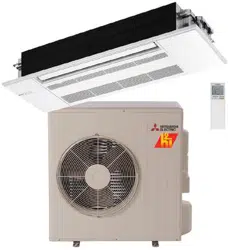Loading ...
Loading ...
Loading ...

45˚± 2˚
A
C
D
B
ø
A
R1/64 to R1/32
(inch)
A Liquid pipe
B Gas pipe
C Insulation
D Taping
A Flare cutting dimensions
B Flare nut tightening torque
90˚± 0.5˚
Fig. 4-5
4. Refrigerant piping work
4.3. Connecting pipes (Fig. 4-4, Fig. 4-5)
• Fasten are nut with a torque wrench as specied in the table (refer to 4.2.).
• When fastened too tight, are nut may eventually break and cause refrigerant leak-
age.
[Fig. 4-5]
• Apply thin layer of refrigerant oil to pipe and joint seating surface before tightening
are nut.
A
• Use 2 wrenches to tighten piping connections.
B
• Use leak detector or soapy water to check for gas leaks after connections are
completed.
• Apply refrigerant oil over the entire are seat surface.
C
• Use the are nuts for the following pipe size. D
KA09, KA12 KA15, KA18
Gas side Pipe size inch (mm) 3/8 (9.52) 1/2 (12.7)
Liquid side Pipe size inch (mm) 1/4 (6.35) 1/4 (6.35)
*1: The are nut is attached to its pipe.
*2: The are nut is in the outdoor unit accessory.
Do not use the are nuts other than the attachment. If it is used, a gas leakage or
even a pipe extraction may occur.
• Refrigerant pipe bending radius must be 4 in. (100 mm) or more.
• Make sure the pipes do not contact the compressor. Abnormal noise or vibration
may result.
1 Pipes must be connected starting from the indoor unit.
Flare nuts must be tightened with a torque wrench.
2 Flare the liquid pipes and gas pipes and apply a thin layer of refrigerant oil
(Applied on site).
Warning:
Be careful of ying are nut. (Internally pressurized)
Remove the are nuts as follows:
1. Loosen the nut until you hear a hissing noise.
2. Do not remove the nut until the gas has been completely released (i.e., hiss-
ing noise stops)
3.
Check that the gas has been completely released, and then remove the nut.
A (Fig. 4-5)
Pipe diameter
Flare dimensions
øA dimensions
inch (mm) inch (mm)
1/4 (6.35) 11/32 - 23/64 (8.7 - 9.1)
3/8 (9.52) 1/2 - 33/64 (12.8 - 13.2)
1/2 (12.7) 41/64 - 21/32 (16.2 - 16.6)
A
B
C
D
Fig. 4-4
4.4. Purging procedures and leak test
1) Remove service port cap of stop valve on the side of the outdoor unit gas pipe.
2) Connect gauge manifold valve and vacuum pump to service port of stop valve on
the gas pipe side of the outdoor unit.
3) Run the vacuum pump 15 minutes or more.
4) Check the vacuum with the gauge manifold valve, then close it and shut off the
vacuum pump.
5) Leave as it is for one or two minutes. Make sure pointer gauge manifold valve
remains in the same position. Conrm that pressure gauge shows -0.101 MPa
[Gauge] (-30 in.Hg [-760 mmHg]).
6) Quickly remove gauge manifold valve from service port of stop valve.
7) After refrigerant pipes are connected and evacuated, fully open all stop valves on
both sides of gas pipe and liquid pipe. Operating the unit without fully opening the
valves lowers the performance and causes problems.
8) Refer to 4.1. Refrigerant pipe, and charge the prescribed amount of refrigerant if
needed. Be sure to charge slowly with liquid refrigerant. Otherwise, composition
of the refrigerant in the system may be changed and affect performance of the air
conditioner.
9) Tighten cap of service port.
10) Conduct a leak test
Warning:
When opening or closing the valve below freezing temperatures, refrigerant
may spurt out from the gap between the valve stem and the valve body, result-
ing in injuries.
A
When attaching the control valve to the
service port, valve core may deform or
loosen if excess pressure is applied.
This may cause gas leak.
When attaching the control valve to the
service port, make sure that the valve
core is in closed position, and then
tighten part A. Do not tighten part A
or turn the body when valve core is in
open position.
Precautions when using the control valve
*4 to 5 turns
*Close
*Open
Stop valve for
LIQUID
Adapter for
preventing the
back ow
Stop valve for
GAS
Handle
Low
Handle High
Charge hose
Service port
Control valve
Open
Close
Body
Charge hose
(for R410A)
Vacuum pump (or the vacuum
pump with the function to
prevent the back ow)
Hexagonal
wrench
Service port cap
(Torque 13.7 to 17.7
N•m, 140 to 180
kgf•cm)
Compound pressure gauge
(for R410A)
Pressure gauge
(for R410A)
Gauge manifold valve
(for R410A)
–0.101 MPa
(–30 in.Hg
[–760 mmHg])
Stop valve cap
(Torque 19.6 to
29.4 N•m, 200 to
300 kgf•cm)
en
4
A_VG79Y103H02_EN.indd 4 2019/10/03 10:56:54
005
Loading ...
Loading ...
Loading ...
